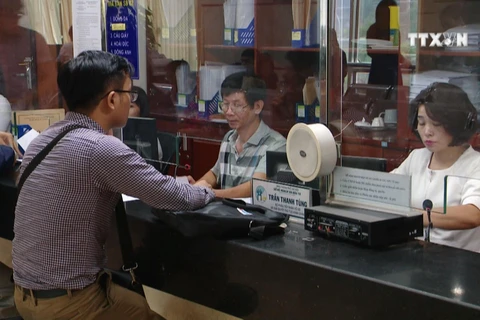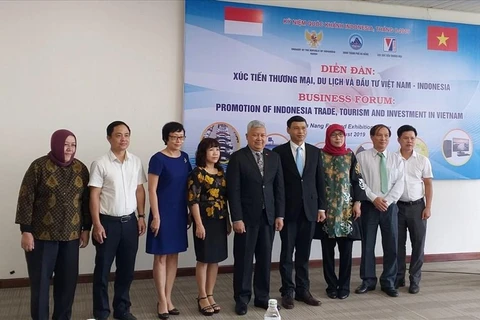Da Nang (VNA) – As a coastal city with considerable sea-related advantages, Da Nang is carrying out an action programme to boost development of blue economy, targeting to turn itself into sea-based economic hub in the future.
The move is part of the city’s efforts to concretise the national sustainable maritime economic development strategy towards 2030 with vision until 2045, which was adopted at the 8th meeting of the 12th Central Committee of the Communist Party of Vietnam.
Under its action programme, Da Nang is targeting a 10 percent contribution by the sea-based economic sectors to the city’s gross regional domestic product (GRDP) by 2025, and 15 percent by 2030. The sectors must develop sustainably in line with international standards, and have good control of natural resource exploitation.
According to the municipal Party Committee, developing the sea-based economy in a sustainable manner is the right and responsibility of all organisations, businesses and local residents. It must be made based on green growth, effective and sustainable exploitation of marine resources, and preservation of bio-diversity.
Besides, the sustainable maritime economic development also means protecting historical values and traditions, as well as ensuring local residents’ participation, benefits and responsibilities on the basis of equality and compliance with the country’s constitution and laws.
The city has considered advanced technologies and sciences, and high-quality human resources as breakthrough elements to protect the sea environment and marine ecosystem, and respond to climate change.
It has focused investment on human resources training and research and investigation activities in the field, while due attention has been paid to international cooperation to develop the sea-based economy based on equality, mutual benefits and respects of independence, sovereignty and territorial integrity of related parties.
Secretary of the municipal Party Committee Truong Quang Nghia said the city’s development progress has been made in tandem with the maritime strategy.
Accordingly, as a sea-based economic hub in the nation, Da Nang city will have a well-developed maritime economy, work to ensure social security and sustainable development, prevent degradation of the sea environment, and restore and preserve important marine ecosystems.
Da Nang city is home to 90-kilometre-long coastline, a fishing ground of 15,000sq.km, and aquatic reserves of about 1.14 million tonnes, and fishing has become a traditional industry in the locality for a long time.
With a goal to become a fishery centre in the central region, the city has made comprehensive investment in fishing port and seafood logistics services. Particularly, Tho Quang port has been upgraded, enabling it to welcome 24,600 boats and handle over 112,300 tonnes of seafood each year.
Aside from the Government’s support, Da Nang has issued its own “breakthrough” policies to support local fishermen over the past few years, including those on managing inshore fishing activities, developing offshore fishing fleets, and protecting and developing aquatic resources.
These policies have encouraged fishermen to upgrade and build boats for offshore fishing, thus helping to improve the quality and value of local seafood.
Da Nang city is also developing vessels supplying fishery logistic services so as to raise the number of logistic vehicles to 15 by 2020 and 50 by 2030.
It looks to increase the caught seafood volume to 38,000 tonnes by 2020 and 45,000 tonnes by 2030, the official said.
Besides supporting local fishermen with safe fishing, competent authorities have worked to raise public awareness of illegal, unreported and unregulated (IUU) fishing, particularly measures have been taken to prevent the fishermen from illegally fishing in foreign waters.
Earlier in 2017, the city approved a plan on developing its sea-based economy towards 2025, with a vision to 2030. Accordingly, it has set a target for the tourist number growth rate at about 13 percent between 2016 and 2030, and the volume of cargo handled at local seaports at 12-13 percent by 2025. It also looks to have the output of processed seafood for export rising by 12-13 percent by 2025 and 8-10 percent by 2030.
Concrete activities are being carried out to create new tourism products relating to marine sports and the yacht industry, to perfect coastal tourism infrastructure, and to enhance knowledge amongst tour guides on marine sovereignty.
Meanwhile, the city is also working to turn Da Nang Port into an international gateway with the Tien Sa and Lien Chieu terminals. Tien Sa terminal will specialise in serving passenger ships and cruises, while Lien Chieu terminal will serve cargo transportation.
Resources are being spent on raising the capacity of the local fishery surveillance force, improving the information system for the management of fisheries, and promoting contact with fishing boats to ensure safety for vehicles and workers at sea.
Seafood processing companies have also been encouraged to apply cleaner production technologies to reduce waste, save materials and energy, and effectively treat sources of pollution.
Total capital needed for developing sea-based economy was estimated at over 19 trillion VND (815.9 million USD) for 2017-2020, 13 trillion VND (558.3 million USD) for 2021-2025, and 17 trillion VND (730.1 million USD) for 2026-2030.–VNA
VNA























